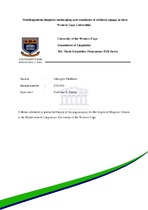| dc.description.abstract | Promotion and practice of multilingualism is of infinite need in a country with such history as South Africa. The need to promote, preserve and maintain languages grows each and every day due to the possibility of languages fading away until they become non-existent. The best system to maintain, preserve and promote all languages existing in a country is to utilize them in a multilingual sense. This is what each mission statement of the three major universities in the Western Cape Province promise; they claim to contribute to multilingualism by encouraging the use of and development isiXhosa, English and Afrikaans as languages of learning and teaching at the institutions. This study set out to investigate the practice of multilingualism in the three universities of the Western Cape considering the quantity and quality (of isiXhosa translation) in the linguistic landscapes. The findings show uneven promotion of the three official languages in all three universities in both the number of signage found and the quality of the translation, and sometimes incomplete translation of isiXhosa signage. At the University of the Western Cape and the University of Cape Town, English proved to be the most favoured language in comparison to Afrikaans and isiXhosa. This tradition of favouring languages was the same at Stellenbosch University, only the language of prestige was different; Afrikaans. Thus among other things the study recommends that policy makers within the three universities should ensure that linguistic landscapes do not just display all three languages, they should make sure that the languages are distributed evenly. Most significant, all the target text should be translated properly. In essence, the universities should employ trained language practitioners for all language related matters. | en_US |

